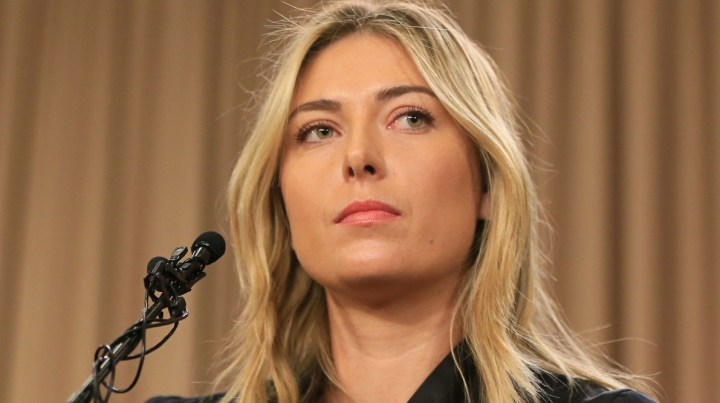Maria Sharapova to be reinstated as UN goodwill ambassador

Maria Sharapova will be reinstated as a UN goodwill ambassador when her suspension from tennis expires next April, the Guardian has learned.
The UN Development Programme, which works to eradicate poverty and inequality, discontinued its nine-year relationship with the Russian in March after she admitted taking the prohibited substance meldonium at this year’s Australian Open. Sharapova was subsequently banned for two years by an International Tennis Federation tribunal, but an appeal to the court of arbitration for sport resulted in a reduced suspension of 15 months, paving the way for Sharapova to return to competitive action before the French Open in May.
The five-time grand slam champion was swift to re-enter the public arena following the verdict, appearing at an Aids charity event in Las Vegas a week later, and her readmission to the UN fold is likely to accelerate her rehabilitation further. Several major sponsors who put promotional deals on hold when Sharapova was initially suspended have since resumed relations with her, Nike and Evian among them. But while those decisions will have been shaped by commercial considerations, UN goodwill ambassadors are appointed on the basis that they are “persons of integrity” who “possess the personality and dignity required for such high-level representative capacity”.
“UNDP was glad to learn that Maria Sharapova can return to the sport she loves sooner than expected and we will lift the suspension of her role as our goodwill ambassador once the reduced ban expires in April 2017,” said a spokesperson for the organization.
The UN’s softened stance, doubtless made easier by the lifting of sponsor suspensions, marks a significant upturn in the fortunes of an athlete whose career was thrown into jeopardy by her admission that she had taken meldonium, a drug that increases blood flow, for a decade. The substance, which Sharapova said she took due to a magnesium deficiency and a family history of diabetes, was added to the World Anti‑Doping Agency’s banned list on 1 January.
Article 17 of the UN guidelines for the designation of goodwill ambassadors stipulates that they must “Refrain from any activity incompatible with the purposes and principles of the United Nations”. Article 32 warns that the arrangement will be terminated if the ambassador “engages in any activity incompatible with his/her status or with the purposes and principles” of the organization.
Despite suspending Sharapova, the UNDP left the door open for a rapprochement by expressing its gratitude for the former world No1’s support and stressing that her activities were being put on ice pending the outcome of her case.
With a Cas panel having determined that her transgression was “not about an athlete who cheated”, it appears the 29-year-old will now be free to resume what she hailed on her appointment in 2007 as one of her “proudest contracts ever”. The position earned Sharapova a symbolic $1 salary, a modest addition to the glut of highly lucrative contracts that, prior to her ban, made her the world’s highest-paid female athlete for 11 successive years until she was deposed by Serena Williams this year.
Sharapova was selected largely on the strength of her charity work on behalf of survivors of the 1986 Chernobyl disaster, a cause close to her heart. Her parents fled the Belorussian city of Gomel, about 80 miles north of Chernobyl, when her mother fell pregnant with the future Wimbledon champion a few months after the world’s worst nuclear accident.
Sharapova marked her initial appointment as a goodwill ambassador by donating $100,000 to help young survivors in rural communities affected by the disaster, and has established a charitable foundation to help recovery efforts.
Last month, Sharapova’s racket sponsor was widely condemned for celebrating news of her reduced ban. But Steve Simon, head of the Women’s Tennis Association, believes she has paid her dues in lost earnings and ranking points – having not played since January, she no longer holds a world ranking – and it would seem that view is shared by the UN.
- Maria Sharapova returns to tennis court for first time since drugs ban
- Dutch ambassador to China suspended amid affair reports
- Ten persons from administration of National Patrolling Inspectorate suspended from their positions
- Search for Chinese sailor attempting to set a world record got suspended
- Andy Murray becomes world number one after Milos Raonic withdraws from Paris Masters
- Roger Federer drops from Top 10 as Andy Murray becomes No.1 tennis player